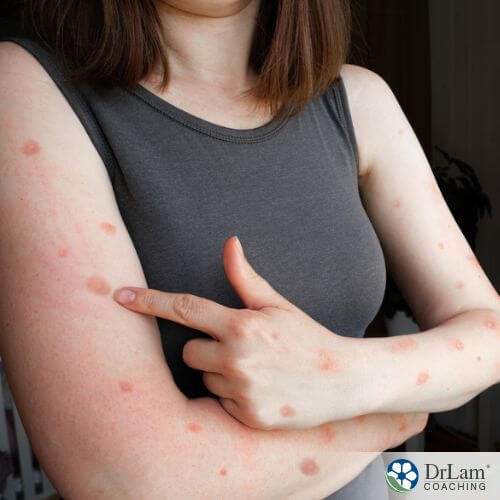 Monkey pox is a virus in the Orthopoxvirus genus along with smallpox and cowpox. Despite the fact that you probably haven’t heard about it before, it isn’t a new virus. It was first discovered in monkeys more than 60 years ago and the first human was infected with it in the 1970s. However, the recent outbreak isn’t confined to Africa, where the virus is endemic. In fact, none of the recent cases were associated with travel to Africa at all, which suggests that the virus is in circulation. By July 26th, 2022, 1,168 cases of monkey pox had been found in New York State alone.
Monkey pox is a virus in the Orthopoxvirus genus along with smallpox and cowpox. Despite the fact that you probably haven’t heard about it before, it isn’t a new virus. It was first discovered in monkeys more than 60 years ago and the first human was infected with it in the 1970s. However, the recent outbreak isn’t confined to Africa, where the virus is endemic. In fact, none of the recent cases were associated with travel to Africa at all, which suggests that the virus is in circulation. By July 26th, 2022, 1,168 cases of monkey pox had been found in New York State alone.
This virus first spreads to humans via exposure to an animal that’s carrying the virus. In the past, the virus has been passed on through human contact with rodents, primates, and even pet prairie dogs. However, these outbreaks were contained fairly quickly. The current outbreak has no known starting point; however, it’s now thought that it can pass from an infected person to someone else through touch or prolonged close contact, including sexual contact.
This virus has been appearing in the news from a variety of different countries. Unfortunately, because it wasn’t thought of as a threat to humans for so many years, there is still limited information on how it spreads and how to stop it.
Monkey pox is closely related to smallpox, so if you had this virus as a child or were inoculated against it, then you may have some immunity. Unfortunately, smallpox vaccinations were discontinued in 1980, so around 70% of the world’s population weren’t vaccinated and now have no immunity against monkey pox. This is an unintended consequence of eradicating smallpox.
When it isn’t caught through contact with animals, monkey pox is usually spread through close, skin-to-skin contact with someone who’s infected. This includes:
Because this virus spreads through contact, it’s also transmissible through sexual contact which includes:
Monkey pox causes some symptoms that are very common among viral infections including:
The rash associated with this virus is quite characteristic and usually appears a few days after the initial symptoms.
Like any other virus, monkey pox can be dangerous. However, it’s less dangerous than other viruses in the same family, such as smallpox. According to WHO, the fatality rate for monkey pox in recent times has been around 3 to 6%. However, according to the CDC, the fatality rate for this West African clade of monkey pox virus appears to be around 1%, so while it definitely isn’t as high as some other strains of monkey pox, it is still significant.
This virus can be more dangerous in some situations and for some people. Some groups that are at risk of a severe case of this type of pox include:
Medical therapies to eliminate the virus usually involve alleviating the symptoms, and there are also some anti-viral medications that can help if you have a particularly bad case. But usually, this virus needs to be left to run its course. Here are some ideas that may help if you get this virus:
 As with most viruses, the best way to avoid the health threat of monkey pox is to avoid infection. You can do this by:
As with most viruses, the best way to avoid the health threat of monkey pox is to avoid infection. You can do this by:
It’s also important that you’re aware of the risk of contracting this virus during sex. Stop this virus from spreading this way by:
One of the best defenses against monkey pox and every other type of virus is to have a strong immune system that can fight off infections. You obviously can’t measure the strength of your immune system, but there are some strategies that may help to boost your immune system such as:
There are a number of different supplements that claim to boost the immune system, but these should be approached with skepticism. There is very little evidence that these types of supplements actually work to improve the immune system. Additionally, it’s important that you try to get all the nutrients that you need from food as this is the best way to ensure that your body gets the nutrient balance that it needs.
If you prefer to be vaccinated, then there are some options available. The first is to be vaccinated for smallpox, which has shown to prevent infection by monkey pox in 85% of cases. Even if you do develop monkey pox after having the smallpox vaccination, the infection is usually far milder and unlikely to become serious.
You may also have been vaccinated as a child if you’re old enough. Check your medical records, talk to your doctor, and look for a small scar on your upper arm, this is usually the sign of a smallpox vaccination.
There is a new vaccination for monkey pox that was release in 2019. With this vaccination, you will need to have two doses. However, there is limited stock of this vaccine, so you may not be able to have it.
If you believe that you’ve been infected with monkey pox, then you need to see your doctor immediately. They will be able to run tests to determine if you have this virus or if something else is causing your rash.
If you test positive for this virus, then you need to isolate and stay away from anyone else. You can also talk to your doctor about anti-viral medications and other options that will help you manage your symptoms.
 Stress can have the effect of depressing your immune system, making you more likely to become sick with infections and viruses. When you’re stressed, your body may also struggle to rid itself of infections, meaning that you stay sicker for longer. This is just one of the negative effects that stress can have on your body.
Stress can have the effect of depressing your immune system, making you more likely to become sick with infections and viruses. When you’re stressed, your body may also struggle to rid itself of infections, meaning that you stay sicker for longer. This is just one of the negative effects that stress can have on your body.
Stress can also cause the adrenal glands to fatigue, as they’re responsible for excreting the stress hormone cortisol. Cortisol and the adrenal glands are part of the NeuroEndoMetabolic (NEM) stress response, which makes changes in your body that help you cope with stress. It does this by changing how the body’s circuits function, making you stronger, more alert, and better able to survive the threat that caused the stress.
The NEM stress response is meant to be a short-term response to stress. But when stress becomes chronic, the NEM stress response must remain active over the long term, resulting in Adrenal Fatigue Syndrome (AFS). Chronic stress results in an ongoing high demand for cortisol. This puts strain on the adrenal glands, which can then struggle to keep up with demand. The high cortisol levels can also start to affect the NEM stress response, causing the related organ systems (circuits) to become unbalanced.
Your Inflammation Circuit is vital in your body’s defence against viruses and other infections. The Inflammation Circuit consists of the immune system, the gut, and the microbiome, which is the balance of bacteria in the body. When your body encounters a virus, this circuit activates and causes inflammation to try to drive the invader out.
But when you have AFS, this circuit can become overactive, reacting to almost anything, causing chronic inflammation. This type of inflammation can be very damaging and is linked to cancer and heart disease. As the immune system becomes dysfunctional, this can increase gut permeability, allowing toxins to flow out of the gut and back into the bloodstream. This can result in increased inflammation as well as allergies and even autoimmune diseases. Bad bacteria can start to outnumber good bacteria in the gut, resulting in increasing inflammation and infections as well.
This shows how a malfunctioning Inflammation Circuit can struggle with a virus such as monkey pox. Your immune system may struggle more than usual to produce the inflammation needed to expel the invaders and you may find yourself getting sicker for longer. This is why, if you suspect you have chronic inflammation or AFS, you should take steps to reduce stress, improve your lifestyle and diet, and lower inflammation levels.
Monkey pox is on the rise in numerous parts of the world and despite the fact that it isn’t as dangerous as other related viruses like smallpox, it can still pose a significant threat to your health. This is especially true if you have adrenal fatigue. To protect yourself:
For more information on this virus and how it might impact your health, talk to our team at +1 (626) 571-1234 or click here.
Monkey pox is a virus in the smallpox family that seems to be spreading relatively quietly through the world, perhaps because of the eradication of smallpox. It causes a characteristic rash, chills, headaches, and other flu symptoms, but is usually much less severe than smallpox.
